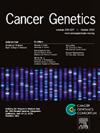半凝集素-9通过使巨噬细胞向M2表型极化促进结肠癌的发展
IF 2.1
4区 医学
Q4 GENETICS & HEREDITY
引用次数: 0
摘要
半乳糖凝集素-9在多种肿瘤中发挥多种作用,在肿瘤微环境中发挥免疫调节作用。它与肿瘤预后密切相关。本研究旨在分析半乳糖凝集素-9在结肠肿瘤微环境中的表达。结果表明,半凝集素-9在结肠肿瘤微环境中的表达高于邻近正常组织。此外,半乳糖凝集素-9的高表达与m2型巨噬细胞有关,其通过增加肿瘤细胞的活力、迁移和侵袭来促进肿瘤的发展。值得注意的是,在结肠肿瘤微环境中,半乳糖凝集素-9的高表达促进了M2细胞的极化,表现为精氨酸酶-1、CD163、IL-10的高表达和iNOS的低表达。M0巨噬细胞经半凝集素-9处理后与结肠癌细胞系共培养,通过促进THP-1单核细胞向M2巨噬细胞的分化,促进癌细胞的生长、迁移和侵袭。半乳糖凝集素-9促进M2极化的具体机制包括其与Tim-3结合,将PI3K-p85招募到Tim-3的细胞质结构域。这种相互作用进一步影响PI3K/Akt信号通路,导致M2极化。本文章由计算机程序翻译,如有差异,请以英文原文为准。
Galectin-9 promotes colon cancer development by polarizing macrophages toward the M2 phenotype
Galectin-9 plays multiple roles in various tumors and exerts immune regulation within the tumor microenvironment. It is closely associated with tumor prognosis. This study aimed to analyze the expression of galectin-9 in the colon tumor microenvironment. The results indicated that galectin-9 expression is higher in the colon tumor microenvironment compared to adjacent normal tissues. Furthermore, high expression of galectin-9 was related to M2-type macrophages, which promote tumor development by increasing tumor cell viability, migration, and invasion. Notably, high expression of galectin-9 in colon tumor microenvironment contributed to the polarization of M2 cells, marked by high expression of arginase-1, CD163, and IL-10 and low expression of iNOS. When M0 macrophages were treated with galectin-9 and co-cultured with colon cancer cell lines, it resulted in increased cancer cell growth, migration, and invasion by promoting the differentiation of THP-1 monocytes into the M2 macrophages. The specific mechanism by which galectin-9 promotes M2 polarization involves its binding to Tim-3, recruiting PI3K-p85 to the cytoplasmic domain of Tim-3. This interaction further affects the PI3K/Akt signal pathway, leading to M2 polarization.
求助全文
通过发布文献求助,成功后即可免费获取论文全文。
去求助
来源期刊

Cancer Genetics
ONCOLOGY-GENETICS & HEREDITY
CiteScore
3.20
自引率
5.30%
发文量
167
审稿时长
27 days
期刊介绍:
The aim of Cancer Genetics is to publish high quality scientific papers on the cellular, genetic and molecular aspects of cancer, including cancer predisposition and clinical diagnostic applications. Specific areas of interest include descriptions of new chromosomal, molecular or epigenetic alterations in benign and malignant diseases; novel laboratory approaches for identification and characterization of chromosomal rearrangements or genomic alterations in cancer cells; correlation of genetic changes with pathology and clinical presentation; and the molecular genetics of cancer predisposition. To reach a basic science and clinical multidisciplinary audience, we welcome original full-length articles, reviews, meeting summaries, brief reports, and letters to the editor.
 求助内容:
求助内容: 应助结果提醒方式:
应助结果提醒方式:


